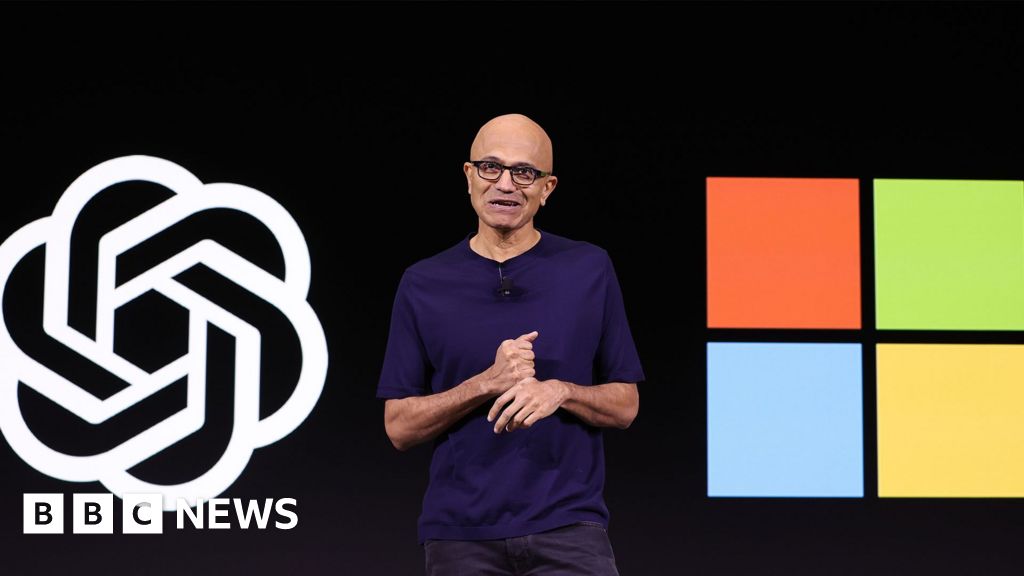UK competition watchdog drops Microsoft-OpenAI probe
- BBC News
The UK competition watchdog has ended its investigation into the partnership between Microsoft and the maker of ChatGPT, OpenAI.
The Competition and Markets Authority (CMA) was looking into whether Microsofts relationship with what is the worlds best known artificial intelligence (AI) firm changed after the turmoil which saw its boss Sam Altman fired and then rehired.
The CMA has concluded that, despite Microsoft investing billions of dollars into OpenAI and having exclusive uses of some of its AI products, the partnership remains the same, so is not subject to review under the UKs merger rules.
Digital rights campaigners, Foxglove, said it showed the CMA had been "defanged."
The CMA opened the probe in December 2023, after Microsoft had put pressure on OpenAI to re-employ Mr Altman, days after he had been sacked.
"In view of Microsofts potentially important role in securing Sam Altmans re-appointment, the CMA believed there was a reasonable chance that an investigation would reveal that Microsoft had increased its control over OpenAIs commercial policy," the watchdog said.
But on Wednesday, it concluded Microsoft "exerts a high level of material influence" over OpenAIs commercial policy without fully controlling it.
"Because this change of control has not happened, the partnership in its current form does not qualify for review under the UKs merger control regime," CMA Executive Director for Mergers Joel Bamford posted in an article on LinkedIn.
But he added: "The CMAs findings on jurisdiction should not be read as the partnership being given a clean bill of health on potential competition concerns; but the UK merger control regime must of course operate within the remit set down by Parliament."
Critics though say the decision is linked to the changed political environment the CMA is now operating in.
The government has instructed the countrys regulators to suggest ways of stimulating economic growth.
In January, the government removed the then chair of the CMA, Marcus Bokkerink, because it was unhappy with his response to that call.
He was replaced on an interim basis by Doug Gurr, former boss of Amazon UK.
"The CMA has sat on this decision for over a year, yet within just a few weeks of a former Amazon boss being installed as chair, it has decided everything was absolutely fine all along, nothing to see here," said Foxglove co-executive director Rosa Curling.
"This is a bad sign that Big Tech has successfully convinced the prime minister to defang our competition regulator and let Big Tech gobble up the current generation of cutting-edge tech – just like they did the last one," she told the BBC.
When BBC News contacted the CMA for a response to these comments, they pointed us to Mr Bamfords LinkedIn post, where he said: "We are not blind to the length of time that this investigation has taken... We know pace matters to business confidence and investment."
He added the reason this investigation took so long was because the relationship between Microsoft and OpenAI had been changing over that time.
In 2024, while Mr Bokkerink was chair, the CMA also issued similar "found not to qualify" decisions on other AI partnerships it reviewed involving firms including Microsoft, Amazon and Google.
In April of same year, the CMAs chief executive Sarah Cardell said the body had "real concerns" about an "interconnected web" of AI partnerships between big tech firms.
But in a set of instructions to the CMA issued in February, the government said it should prioritise "pro-growth and pro-investment interventions".
The same month the UK sided with the US in not signing an agreement on AI at a summit in Paris.
US Vice President JD Vance had told delegates that too much regulation of AI could "kill a transformative industry just as its taking off".
"The CMA will be taking a less interventionist approach to protecting competition and to merger control reviews, [but] this does not mean the CMA will approve every deal presented to it without question," said Chloe Birkett, competition lawyer at law firm Freeths.
"The CMAs purpose is to help preserve competition in markets to ensure that consumers get a fair deal," she said.
In a statement Microsoft said: "Our OpenAI partnership and its continued evolution promote competition, innovation, and responsible AI development, and we welcome the CMAs conclusion, after careful and prudent consideration of the commercial realities, to close its investigation."
Additional reporting by Tom Singleton and Chris Vallance.